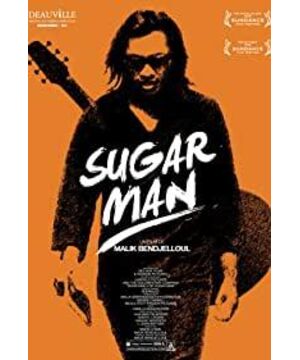This documentary has been carefully designed and has a little suspenseful approach. Rodriguez itself is indeed very dramatic. It is zero in the United States and hero in South Africa. But a musician like him, like this drama that happened to him, is a handful of sand in the music circle. If Xue Chai squatted down to observe the sand, we would not have so many emotions and tears to squander.
Take Dennis Coffey, who appeared in the opening film, as an example. In terms of dramatic contrast, he is weaker than Rodriguez, but his experience is exactly the same as Rodriguez. In the hearts of funk fans, or a little more, in the hearts of groove fans, dennis coffey is a brilliant guitarist, and his popularity is not inferior to jimi, the public enemy debut single [you're gonna get yours] The powerful guitar riff is sampled from the masterpiece [getting it on] by dennis coffey. After the 1970s, Dennis Coffey withdrew from the music circle. To put it awkwardly, he was also abandoned by the industry. Later, he has been working in the Fox factory in Detroit for a living. A reporter asked a few years ago: Do you use your guitar hand to assemble parts? Dennis Coffey replied faintly:
Yes.
I have a long list of names, which can be divided into musicians, arrangers, and producers if it is subdivided. They are all alive in obscurity, the groove classics born by them, the performance, the arrangement, and the production, that's awesome! Every time I listened to it, I froze: Is it necessary to play a song like this? It's just a fucking song! Only sixty points! Why is there an oxygen cylinder hidden in the sixtieth minute, emitting pure oxygen? I don’t know how HB Barnum and others would answer this kind of stupid question. Is it professionalism? Can't let go of self-esteem? I can't guess it.
There is an allusion in the music circle. An American producer admires the reputation of Jamaican dub producer, standing in the spotlight, not behind the scenes. The Jamaican dub mixer said in a dark place: when we publish works in Jamaica, it is difficult for our mixer to be signed.
Is this an allusion? I think it is a high-level sneer, and there are countless accounts of this kind of confusion in the music circle. In the film, the reporter asked Rodriguez: Are you surprised that the album could not sell? He replied: This is the music industry, so there is no guarantee.
Compared with Rodriguez's era, this industry is even more unreliable.
In the film, the dismissive attitude of the owner of the sussex record company was ridiculed and criticized by many people. In fact, the father's reaction was too normal and taken for granted. What is 500,000? Even the mere platinum sales did not arrive. Rodriguez’s album was released by sussex, which was a misplacement in itself. In the 1950s and 1960s, sussex made a living by releasing jazz albums such as old age. It released a folk song album, not to mention a non-white folk song album. The 1970s were forgotten, not injustice.
As for Rodriguez, the United States does not shine in South Africa, the biggest selling point in this film. . . . . . I might as well cite an example that is quite vulgar: Ren Xianqi's "Heart Too Soft" was released in Taiwan in 1997 and encountered zero response. Nanjing Audiovisual Publishing House introduced this tape, [the heart is too soft] from Nanjing to Beijing, Shanghai, Xinjiang and Tibet. I guess Ren Xianqi felt very sad after watching this film. ^_^ After
all, the most touching thing about this documentary is those South African music fans who are looking for you because they love you and love you so they are looking for you. Music fans are actually just as cute as musicians. On the afternoon of July 24, 2012, when I arrived at the Hong Kong Asia Exhibition Hall and saw the poster of the stone roses in the hall, I immediately covered my mouth and stood on the side sobbing. Presumably, the South African music fans on March 6, 1998 were the same as me. When we were young, we held a replica of Rodriguz, the slapstick of the stone roses, and we never dreamed that we would be in their concert one day.
I dream that one day there will be a documentary filming East German music fans, telling the world how those East German children (such as members of jazznova) listened to music before the fall of the Berlin Wall, and how they begged their fathers who held important positions in government agencies. Mother, grandparents, parents-in-law took the opportunity of going abroad to bring back records of public enemy, beastie boys.
View more about Searching for Sugar Man reviews








